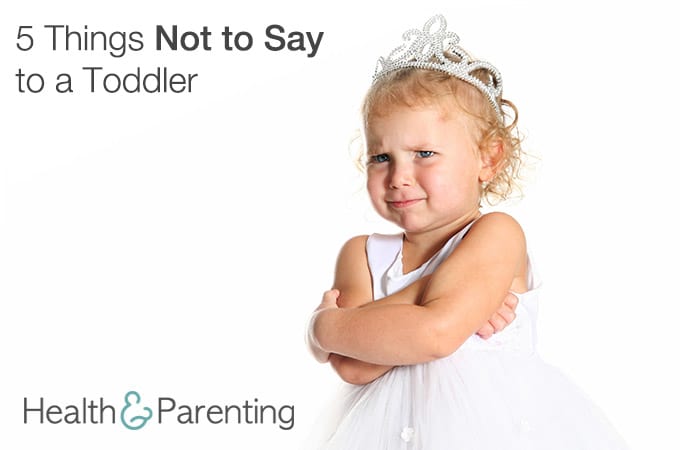As your baby grows older, parenting gets trickier. These days, you’re not worried about the logistics of diaper changes or which diaper cream to use, the problems you encounter are growing more complex. You may be starting to think carefully about how you talk to your child. As your baby becomes a toddler, the words you say could have a big impact on his perception of the world. Choosing your words carefully could also save you a lot of hassle, so it’s worth taking a moment to think before you open your mouth. Here are five things you shouldn’t say to a toddler (and what to say instead):
- Be careful!
Toddlers are a little unsteady on their feet and sometimes they stumble. For a parent, this can be nerve wracking, and you may find yourself shouting “Be careful,” a lot. While this may seem like a good way of keeping your toddler accident-free, your words could actually distract him from the task in hand, leaving him more likely to tumble. Toddlers and babies are good at picking up on your emotions. Even from across the playground, your toddler can sense that you’re scared by the sound of your voice. This, in turn, could then leave your toddler feeling scared as well. If you can’t keep quiet, try saying “hold on tight,” or “one step at a time”.
- Don’t
Toddlers (and, in fact, adults) respond better to dos than don’ts. It’s just easier for our brains to understand a simple instruction than try to work backwards from a don’t. Instead of saying “don’t run” you could say “walk please”. Instead of saying “don’t draw on the table,”, you could say “paper is for drawing on.” It may not come naturally at first, but after a bit a bit of practice you should find that it gets easier. You’ll also be able to see the benefits of this one straight away. Why not challenge yourself to a week without don’ts and see how you get on?
- I’m busy
Being interrupted every five minutes can be frustrating, especially when you’re in the middle of something important. Try to remember, however, that children are only little once. Before you know it, that little boy will have grown into a teenager and you’ll be left wondering what’s going on inside his head. Telling him you’re too busy to talk now could instill the belief in him that you don’t want to hear what he has to say. It’s ok to be busy, but try to explain nicely, “I need to finish this job, it will take five minutes, then we can play together.”
- Hurry up!
Children have no real sense of urgency, and that is particularly annoying when you’re running late for work or are about to miss your train. If you often find yourself pleading with your kids to ‘hurry up’, then you’ve probably already noticed how ineffective this tactic is. Instead of demanding that they hurry up, incentivize them to be faster. That doesn’t mean offering bribes, instead it means turning it into a game. This theory can be applied to pretty much all toddler dilemmas. Toddlers love to play and utilizing this will make your life easier. See who can get their shoes on the fastest, or do the funniest walk on the way to the train station.
- No
The thought of parenting a toddler without using the word ‘no’ probably sends shivers down your spine. Perhaps you’re not even aware of how often you use it, but that word is likely to be a regular feature in your day to day life. Does that matter? Yes, the more toddlers are told no, the less attention they pay to the word. If you use it only in times of danger, your toddler is likely to take it seriously. If, however, ‘no’ is the most commonly used word in your vocabulary, your toddler will, in time, simply ignore it. Instead of just saying ‘no’, try calmly explaining why you don’t want your toddler to do something. You may be surprised to discover how many times you automatically try to stop your child doing something for no real reason.
Written by Fiona (@Fiona_Peacock), mother, writer and lover of all things baby related.
This information is not intended to replace the advice of a trained medical doctor. Health & Parenting Ltd disclaims any liability for the decisions you make based on this information, which is provided to you on a general information basis only and not as a substitute for personalized medical advice. All contents copyright © Health & Parenting Ltd 2016. All rights reserved.










